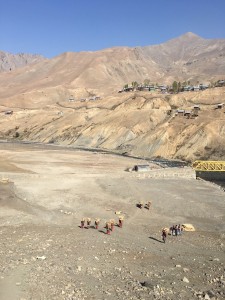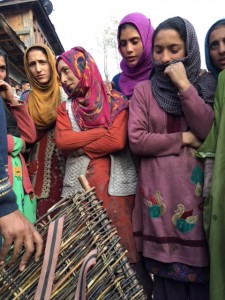“Should we suffer because we are peaceful, love the country and wish to contribute more and more for its development?” Asked an elderly villager while discussing the valley’s slow pace of development during 40th shodhyatra last month. Walking down from chakwali, the last village of our country on the northern tip in this region in Jammu and Kashmir, a common site was women bringing 50-60 kg of wood on their back in baskets made of local plants. The protrusions on the baskets hurt their backs badly. They needed new designs urgently. If we cannot remover their burden, can we make it bearable?
One room needs that much quantity for warming it during the night when temperatures goes down to minus 6-7 degrees. After a week or two, there will be 20-30 feet snow fall, the region will get cut off for practical purposes except through defense forces transport. Keeping house warm will be even bigger challenge. Thankfully, Tawsif, a local innovators from another region of Kashmir has developed an energy eifiicnet bukhari, oom warmer. It may keep room warm in just about 3-4 kg for the night. It will be revolution in energy saving and bring a great relief to the women here. Some of the shodhyatris offered to pay for such bukharis costing about 7500 rupees to be urgently deployed and tested in the region. Follow up has begun through Honey Bee Network and NIF cell at Kashmir University, Srinagar, under the voluntary leadership of prof G M Bhat. SRISTI team worked for more than a month in advance preparing for the shodhyatra in collaboration with other volunteers of the Network including Nadeem, and Sabjar.
Never before, were so many problems faced by local groups so well identified by children and women along with possible solutions in some cases. A region without internet, mobile phone connections and practically neglected by markets and the state was endowwed with abundant human ingenuity and creative spirit.
A tremendous scope for adding value to their ideas and local herbal knowledge and bring local products into market was also felt. Honey Bee Network through SRISTI & NIF proposes to stay engaged with local communities in this region. NO hydro-turbine has been used in the area, solar energy has also been used sparingly only for light, and many of the batteries have already got out of order. Some children wondered: could not solar energy be used for keeping kangri (portable stove inside phren, long overcoat), or bukhari warm? How can sunlight be taken inside their houses. They got power only for 4-6 hours a day and that too not regularly through generators. But there was river flowing along side. Its energy remained to be tapped.
Few innovations, which caught the yatris’ eyes were herbal Tablets made by school students (Khalid Hussain and Mir Zamman) using local herbs for stomach-ache; a device for holding better grip of shoes in snow by Arshad Ahmad Lone; extra-wheel for Baskets for carrying weight by Arshid Khan. She also suggested to innovate a roti maker. The design of snow shoe was not very popular in the region.
When mothers had to hold baby in lying position in arms, the existing baby holders will not work. This was a specific challenge posed by Haneefa Begam. She wanted her hands to be free while doing work with minimum discomfort to the child.
Shodhyatris also setup a library in Govt Higher Secondary School, Badogam by giving about one thousand books to school, thanks to the contribution by Shail Desai, a Honey Bee Network volunteer of Mumbai. Many shodhyatris others resolved to pool books for similar contribution to the other schools.
One of the most redeeming facts was almost total absence of malnutrition among children. Mothers breast feed their children for two to three years, and grow vegetables in small garden. The Communities have high respect for elders. The extraordinary hospitality for guests and visitors was also very inspiring. The Yatris, who received affectionate response in each village, enjoyed local cuisine based on non-cultivated plants in some villages.
This was the first time in the last three decades, yatris came across a published history of a village. Pride of people in local culture, history and natural resourecs can be harnessed for prompting responsible tourism. So far outsiders had not ever come this far. The stay homes are to come about. We stayed in schools where teachers were very warm and helpful, thanks to the prior communication by education department announcing our walk in the region. More lessons and challanges will be shared next week. If you wish to join hands for the sustainable development of the region, write back to shodhyatra@sristi.org

